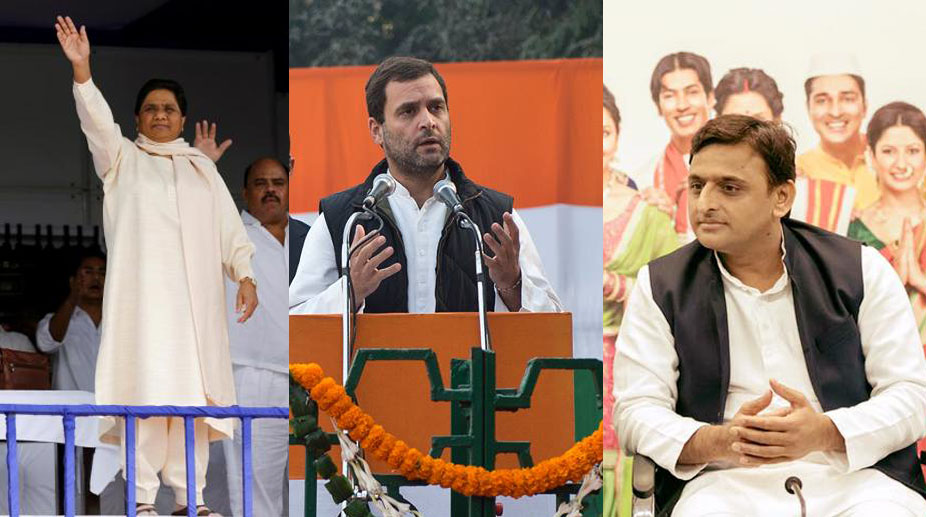AAP councilors protest against cancellation of mayoral polls
The party may move the court after taking legal opinion on the matter, said AAP leader Durgesh Pathak.

The Opposition sees next months polls to five states as a mini general election and a referendum on Prime Minister Narendra Modi's demonetisation move, while the BJP hopes that the fight against black money may enlarge its voter base. Voters in Punjab, UP, Uttarakhand, Goa and Manipur amounting to 20 per cent of the countrys population will exercise their franchise.
So what is at stake for the players in these states? The BJP is a major stake-holder except in Manipur where it is yet to open its account. The party has not declared any chief ministerial candidate for any of the states. The BJP is ruling in Punjab and Goa while the Congress is ruling Uttarakhand and Manipur. The Samajwadi Party rules UP.
The polls will be the first political test after the demonetisation. The BJP had won 72 of the 80 seats in the 2014 Lok Sabha polls in UP. There will be a four-cornered contest between the SP, the Bahujan Samaj Party, the BJP and the Congress.
Advertisement
The BJP hopes that the Modi magic may continue. Moreover more legislators from UP means more Rajya Sabha MPs where the party is in a minority. Thirdly the BJP is on an expansion mode and wants to add the votes of OBCs, Dalits and the poor. A win in UP will be a morale booster for Modi when he makes a bid for his second term in 2019. A defeat will embolden the opposition to take on Modi inside and outside parliament. In Punjab the BJP-Akali Dal coalition is bidding for a third term facing severe anti-incumbency.
The Congress is surging forward under the leadership of Captain Amarinder Singh, who is fighting his last battle. The new entrant AAP is a worry. Law and order, drugs, corruption and scams are the main issues. In Goa too the BJP faces antiincumbency, fight with the RSS and lack of local leadership. In Uttarakhand the fight is between the BJP and the Congress as the two had alternated in power since 2000. The BJP has no chief ministerial face while the Congress has declared Harish Rawat as its chief ministerial candidate.
As for the Congress, the party is trying to revive after its humiliating defeat in 2014. A win in any of the states will be a morale booster for party vice-president Rahul Gandhi who is poised to take over the party soon. Its biggest disadvantage is its lack of local leadership and lack of organisation. The Congress is making efforts to revive in UP where it had its last chief minister in 1989. The partys efforts for an alliance with SP or RLD have not been successful so far. It is hoping to get back the Brahmin, Muslim and Dalit votes, its core constituency at one time.
The Congress is bidding for power for a second time in Uttarakhand facing anti-incumbency. There is public sympathy for the Congress after it was dismissed and the court restored the Harish Rawat government last year. A loss in Uttarakhand means the number of Congress ruled states will shrink further.
The Congress is in a threeway battle in Punjab and Goa where it is trying to wrest power from BJP-SAD alliance and BJP-MGP alliance respectively.
The young party, AAP, is the new entrant in both states. Although Congress has a brute majority in Manipur where it has 50 of the 60 MLAs, Chief Minister Okram Ibobi Singh is facing major administrative challenges as the blockade in the tiny state continues. The BJP had been making efforts to destabilise the Congress government for some time.
The BSP is poised to return to power in UP but it needs some plus votes apart from those of the Dalits. For this, the BSP supremo Mayawati has been wooing the Muslims. The party currently has 80 MLAs in UP. In 2012, the BSP secured 4.28 per cent of votes in the Punjab polls but failed to win a single seat. In the Uttarakhand assembly, the BSP has three members.
The Samajwadi Party is fighting for its survival. The SP won a handsome 224 seats in the 2012 poll while the BJP is looking to improve the 42 per cent vote share it got in the 2014 Lok Sabha polls. The SPs core voters are Muslims and Yadavs. Chief Minister Akhilesh Yadav has emerged victor in the ongoing family feud by taking over the party forcibly from his father Mulayam Singh. A result favouring Akhilesh would establish him not only in UP but also in the country. Mulayam will fade away if he does not patch up,with his son. A rout will result in a clear split.
The AAP is looking to enter states like Punjab and Goa as an alternative to the BJP and Congress. Though it started well in Punjab and Goa, it is losing ground because of lack of local leadership. It got four MPs in the 2014 Lok Sabha polls. The AAP has declared Elvis Gomes as its CM candidate in Goa. A win in the coastal state will help AAP to establish its support base beyond North India.
The SAD is bidding for power for the third time facing strong anti-incumbency. The SAD-BJP combine is on a weak wicket fighting an emerging Congress and the AAP. Ageing Chief Minister Prakash Singh Badal is fighting his last battle. March 11 will reveal the fate of all these parties when the results are announced.
Advertisement